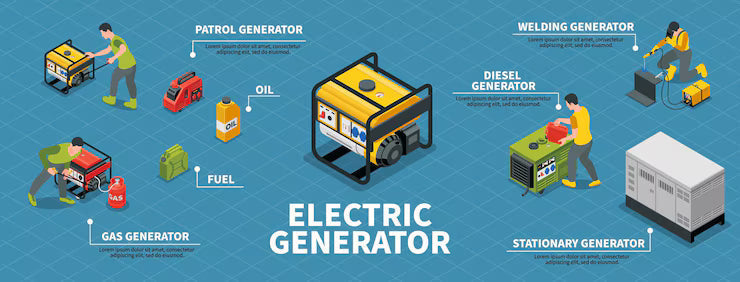Generators
Generators: Power When You Need It Most

Generators are essential for providing backup power during outages, powering tools at job sites, and driving sustainability through hybrid and smart technologies. Whether they run on gasoline, diesel, propane, solar, or wind, these machines play a vital role in keeping our homes, businesses, and events running smoothly. With innovations in efficiency and safety, generators are more adaptable and important than ever. Let’s explore how they work, how to choose one, and what features matter most.
How Generators Produce Electricity
Generators use electromagnetic induction to turn mechanical energy into electrical energy:
- A prime mover (engine or turbine) spins the generator’s rotor.
- The rotor interacts with magnetic fields, inducing current in the stator’s coils.
- A voltage regulator maintains consistent output, while a cooling system protects against overheating.
It’s precision engineering in action—transforming motion into usable power.
Types of Generators
Different jobs call for different generator types. Here’s a breakdown:
| Type | Fuel Source | Best Use Case |
|---|---|---|
| Conventional | Gasoline/Diesel | Backup power, job sites |
| Solar | Sunlight | Eco-friendly, quiet applications |
| Wind | Turbine-powered | Off-grid or renewable systems |
Each offers a unique blend of efficiency, cost, and sustainability.
Key Generator Components
A generator’s reliability depends on its internal systems:
- Rotor & Stator: Generate electricity through magnetic fields
- Engine: Powers the rotor with mechanical force
- Voltage Regulator: Maintains consistent power flow
- Cooling System: Prevents overheating during prolonged use
Together, these parts must operate in harmony to deliver dependable energy.
Portable vs. Standby Generators
| Feature | Portable Generator | Standby Generator |
|---|---|---|
| Mobility | Lightweight, manually placed | Permanently installed |
| Power Output | Lower, suitable for basic needs | Higher, supports full home/business |
| Activation | Manual startup | Automatic start during outages |
| Best For | Events, job sites, occasional use | Home backup, commercial continuity |
Common Uses
- Emergency Backup: Powers lights, fridges, medical equipment during outages
- Job Sites: Runs tools and lighting in remote areas
- Outdoor Events: Powers sound systems, cooking setups, charging stations
- Mobile Units: RVs, camper vans, food trucks
Anywhere power is needed—generators deliver.
Fuel Options
Choose your fuel wisely:
| Fuel Type | Pros | Cons |
|---|---|---|
| Gasoline | Easy to source, portable | Short shelf life, flammable |
| Diesel | Durable, fuel-efficient | Noisier, higher upfront cost |
| Propane | Clean-burning, stores well | Slightly lower output |
| Solar | Renewable, silent operation | Weather dependent, higher initial cost |
The right fuel boosts performance and reduces long-term costs.
Sizing Your Generator
Accurate sizing avoids overloads and inefficiency:
- List all essential devices.
- Check wattage needs.
- Add extra power margin for startup surges.
- Choose a generator that meets or slightly exceeds your total.
Smart sizing = reliable performance + fuel savings.
Maintenance Tips
Keep your generator running strong:
- Change the oil regularly
- Clean/replace air filters
- Inspect spark plugs and wires
- Test the generator monthly to ensure readiness
Proactive care avoids breakdowns when you need power most.
Safety Best Practices
Stay safe with these generator tips:
- Operate outdoors only—never in enclosed spaces
- Keep away from windows and doors to prevent carbon monoxide buildup
- Let the generator cool before refueling
- Use weather-rated cords and avoid overloading circuits
Safety is power’s best companion.
Industry Innovations
The generator industry is evolving fast:
- Smart Generators: App-controlled, with diagnostics and fuel monitoring
- Hybrid Systems: Combine solar with fuel-based backup
- Fast-Charge Batteries: Extend usage and reduce noise
- Eco-Conscious Designs: Lower emissions, quieter operation
These advances are reshaping how we access off-grid and emergency power.
Frequently Asked Questions
Can generators be used indoors?
No. Operating fuel-based generators indoors poses serious carbon monoxide risks. Always use outside in well-ventilated spaces.
Can I integrate a generator with solar systems?
Yes! Hybrid setups allow solar and fuel-powered units to work together, ensuring 24/7 reliability.
How long do generators last?
With proper care, conventional generators can run for 2,000–5,000 hours. Solar systems often last even longer.
Is there a silent generator?
Solar generators and inverter models offer near-silent performance—ideal for indoor and nighttime use.
Do generators need to be grounded?
Yes. Proper grounding ensures safe operation and protects against electrical faults.
Final Thoughts
Generators keep our world turning when everything else stops. Whether we’re working, celebrating, or simply keeping the lights on, they transform mechanical motion into electricity that powers our lives. With options from gasoline to solar, innovations in safety and tech, and endless applications, choosing the right generator is about finding power you can trust—anytime, anywhere.




